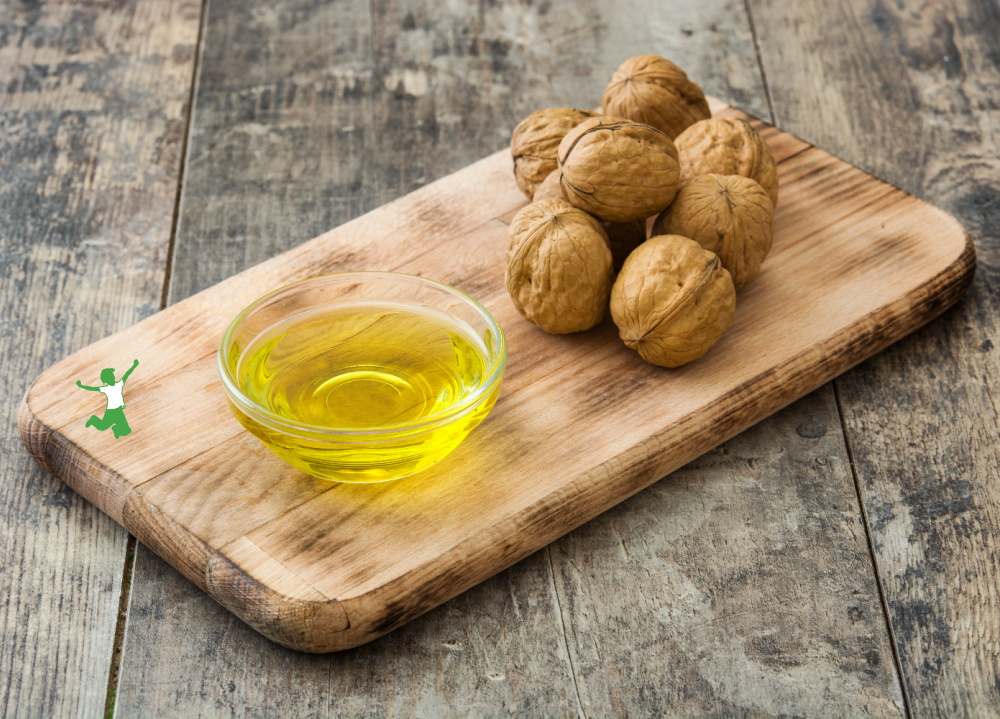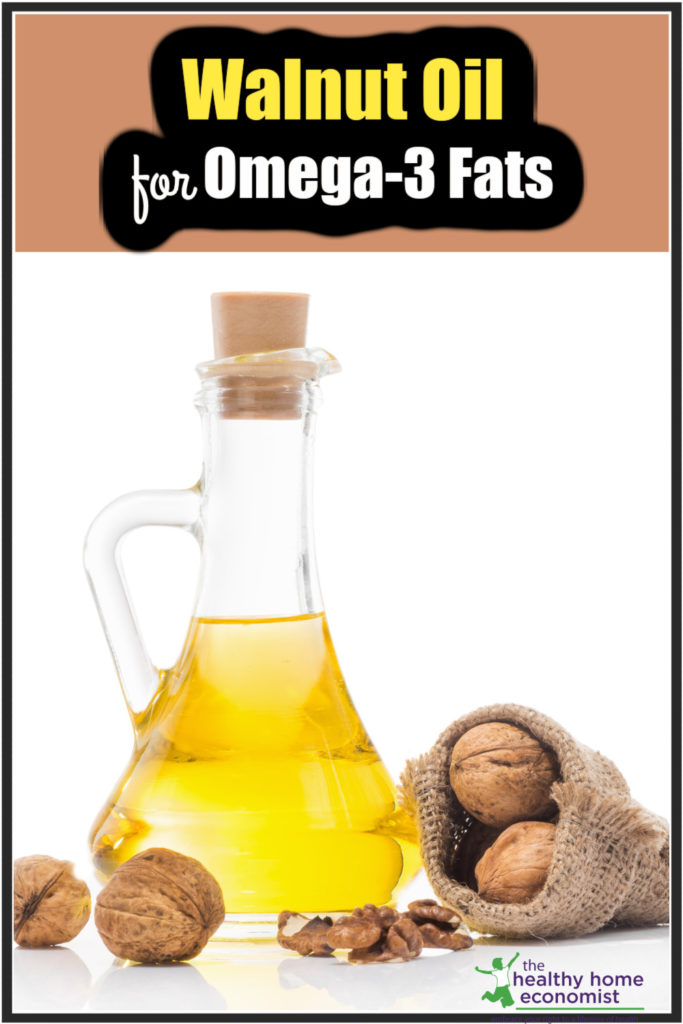Table of Contents[Hide][Show]
Examination of walnut oil as an important exception to the toxic “seed oil” rule with a high amount of inflammation-reducing omega-3 fats and health benefits exceeding flaxseed oil.

In the early 1990s when I first began eating organic produce and clean meats, I discovered the wonders of walnut oil.
I was introduced to this high omega-3 oil by an Ayurvedic MD. She was coaching me on some very necessary diet and lifestyle changes to regain my health lost from a “burn the candle at both ends” corporate lifestyle.
Good Source of Omega-3 Fats
Prior to Dr. Wright’s recommendation to add walnut oil to my diet, I had never before heard about the health benefits of inflammation-reducing omega-3 fatty acids.
I certainly had never heard of cod liver oil. My introduction to the groundbreaking work of Dr. Weston A. Price was still quite a few years away.
I was delighted by the slightly nutty clean flavor of walnut oil.
So, I enthusiastically started using it daily with breakfast…a small amount drizzled over a bowl of cold breakfast cereal made with organic amaranth. 🙄
Boxed cereal is definitely not the best way to start the day, but I still had a lot to learn back then!
However, I was moving in the right direction and even a small amount of progress in my diet proved to be extremely helpful to my health!
Walnut Oil is Far Healthier than Flaxseed
When it comes to plant forms of omega-3 fats, flax oil is the usual choice. Walnut oil is usually not even considered for some reason.
However, flax oil is known to sometimes exacerbate hormonal issues.
This observation from Raine Saunders, author of Agriculture Society and Heal Your Gut With Food, touches on the subject:
Something I try to be mindful of are foods which are very high in estrogenic properties. Even natural foods like flax seeds and flax oil, like many other foods (soy, sesame seeds (oil), and various beans), are very high in estrogen and can make certain health issues worse such as fibroids or fibrocystic breast conditions.
Even if you have a traditional, balanced diet, even moderate consumption of these foods could be problematic anyway because of all the xeno-estrogens in our environment from plastics and other chemicals, which are increasingly pervasive in the world due to industry use and production of new chemicals.
Common side effects of women who consume flaxseed oil are cystic or sore breasts.
This can be a warning sign which is often missed by those who do not observe any connection between what they eat and how they feel.
Clearly, there are potential dangers of consuming flax in this modern age with all the estrogen-mimicking chemicals literally everywhere in our food, air, and water.
For this reason, walnut oil is a far better choice than flax oil for adding the plant form of omega-3 fats to the diet.
Note that plant-based omega-3 oils are never a good substitute for animal forms of omega-3 fats such as unrefined cod liver oil.
The animal form of omega-3 fats contains preformed versions (EPA and DHA) with no conversion by the body necessary for optimal use.
This means animal-based omega-3 fats are easier to digest and metabolize, contrary to conventional “wisdom” from plant-based “experts”.
How to Use
Like hemp seed oil, rice bran oil, pumpkin oil, argan oil, grapeseed oil, some types of sunflower seed oil, and any other seed oils oil high in polyunsaturated fats, walnut oil is extremely delicate.
This means that it goes rancid easily with exposure to heat, light, and air.
After purchasing, a bottle of walnut oil must be kept in the refrigerator.
Moreover, never heat walnut oil or use it for cooking.
One or two teaspoons (no more!) added to a batch of homemade salad dressing adds delightful flavor and nutrition.
Remember that even though healthy, omega-3 fats are still polyunsaturated oils. This means they should comprise a very small percentage of the diet.
Be careful not to overdo!
If you’re looking for a good brand of walnut oil, I suggest this unrefined version.
Please note that walnuts are very slightly goitrogenic but far less so than flax.
Hence, if your thyroid is a problem, it may be best to stick entirely with animal-based omega-3 fats with virgin cod liver oil being my pick of the bunch.

More Information
The Many Shades of Palm Oil
Five Fats You Must Have in Your Kitchen
Selecting a Healthy Cooking Oil and Reusing it Safely
Caution When Using Chicken Fat for Cooking
Cooking with Olive Oil: Yea or Nay?
How Vegetable Oils Make Us Fat
Red Palm Oil Benefits Rival Coconut Oil








Thanks! They cold press it and don’t expose it to any heat or acids, so I’m happy with their process; I just haven’t come across any “Real Foodie” opinions.
what kind of beans?
How about hemp seed oil for balanced efa’s?
Oh my, I have those and I use ground flax in my smoothie every day. I am guessing it has ypthe same effect. Thanks.
Seems ok .. but how they process it would have to be closely checked out.
On the subject of plant based omega 3’s, anyone have any thoughts on Camalina oil? We have an organic local source and their sales pitch is reasonable but on the other hand it doesn’t seem to be a very “traditional” fat (although they claim that Europeans have been using it for hundreds of years).
which beans? i have a dinosaur egg in my uterus. gives me no real problems and for the most part we live together in understanding and respect..i don’t do any flax. LOVE homemade sesame milk. and i eat beans.
I am still confused as to animal sources of omega 3s. Is there a way to supplement this? Or are whole foods the only way to get animal omega 3s? (I ask knowing that there is a small amount in CLO, but because the vitamins are so concentrated, it is really not a good omega 3 supplement…also knowing about the yucky processing involved in fish oil supplements…)
Hi Leila, Green Pasture Products does not highly process its cod liver oil and it does have a decent dose of omega 3’s. It is the only brand I choose to use or recommend for this reason. It is my family’s main source of omega 3 fats although we do use plant based oil like walnut on occasion for dressings primarily.
Make sure organic, walnuts are heavy with pesticides if not :/